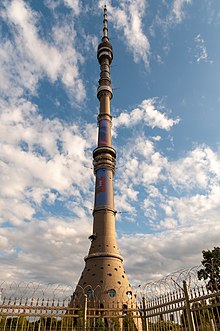
Back إعلام روسيا Arabic Рәсәйҙең киң мәғлүмәт саралары Bashkir Medien in Russland German Venemaa meedia Estonian رسانههای روسیه Persian Médias en Russie French Oroszországi média Hungarian Środki masowego przekazu w Rosji Polish Средства массовой информации России Russian Medier i Ryssland Swedish
This article needs to be updated. (March 2022) |
| Part of a series on the |
| Culture of Russia |
|---|
 |
| Society |
| Topics |
| Symbols |


Television, magazines, and newspapers have all been operated by both state-owned and for-profit corporations which depend on advertising, subscription, and other sales-related revenues. Even though the Constitution of Russia guarantees freedom of speech, the press has been plagued by both government censorship and self-censorship.[note 1]
There are more than 83,000 active and officially registered media outlets in Russia that broadcast information in 102 languages. Of the total number of media outlets, the breakdown is as follows: magazines – 37%, newspapers – 28%, online media – 11%, TV – 10%, radio – 7% and news agencies – 2%. Print media, which accounts for two thirds of all media, is predominant.[5][6] Media outlets need to obtain licenses to broadcast. Of the total number of media outlets, 63% can distribute information across Russia, 35% can broadcast abroad and 15% in the CIS region.[5]
Reporters Without Borders compiles and publishes an annual ranking of countries based upon their assessment of their press freedom records (World Press Freedom Index). In 2016, Russia was ranked 148th out of 179 countries, six places below the previous year, mainly due to the return of Vladimir Putin.[7] Freedom House compiles a similar ranking and placed Russia at number 176 out of 197 countries for press freedom for 2013, at the level of Sudan and Ethiopia.[8] The Committee to Protect Journalists states that Russia was the country with the 10th largest number of journalists killed since 1992, 26 of them since the beginning of 2000, including four from Novaya Gazeta.[9] It also placed Russia at ninth world-wide for journalists killed with complete impunity.[10]
In December 2014, a Russian investigative site published e-mails, leaked by the hackers' group Shaltai Boltai, which indicated close links between Timur Prokopenko, a member of Vladimir Putin's administration, and Russian journalists, some of whom published Kremlin-originated articles under their own names.[11] According to the disinformation analysis centre Debunk.org, Russia's mass media expenditure in 2022 was estimated to be $1.9 billion.[12]
- ^ "Russia's internet law a 'new level' of censorship: RSF | DW | 1 November 2019". DW.COM. Retrieved 13 December 2019.
- ^ Riddle, Denis Grekov for (21 March 2019). "Russia is Censoring More Than Just the Internet". The Moscow Times. Retrieved 13 December 2019.
- ^ "Disrespect Putin and You'll Pay a $23,000 Fine". Bloomberg. 14 March 2019. Retrieved 13 December 2019.
- ^ "Censorship in Russia Explained Formally, there's almost no censorship of the Russian media". Meduza.io. 5 February 2015. Retrieved 13 December 2019.
- ^ a b "Number of media outlets registered in Russia up 24% to 4-year highs — research". TASS. Retrieved 21 December 2016.
- ^ "Роспечать - официальный сайт: Число зарегистрированных в РФ СМИ в январе 2016 года выросло почти на четверть". fapmc.ru. Retrieved 21 December 2016.
- ^ Cite error: The named reference
RSF-1112was invoked but never defined (see the help page). - ^ Cite error: The named reference
FH2013was invoked but never defined (see the help page). - ^ Cite error: The named reference
CPJ-Russiawas invoked but never defined (see the help page). - ^ Cite error: The named reference
CPJ130502was invoked but never defined (see the help page). - ^ Cite error: The named reference
Theins141229was invoked but never defined (see the help page). - ^ Michałowska-Kubś, Aleksandra; Kubś, Jakub (4 May 2023). Kremlin spent 1.9 billion USD on propaganda last year, the budget exceeded by a quarter (Report). Debunk.org. Retrieved 4 May 2023.
Cite error: There are <ref group=note> tags on this page, but the references will not show without a {{reflist|group=note}} template (see the help page).
© MMXXIII Rich X Search. We shall prevail. All rights reserved. Rich X Search